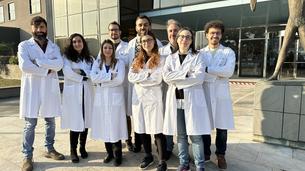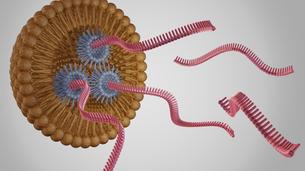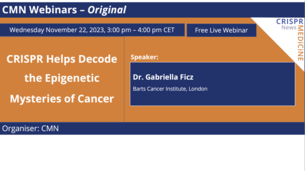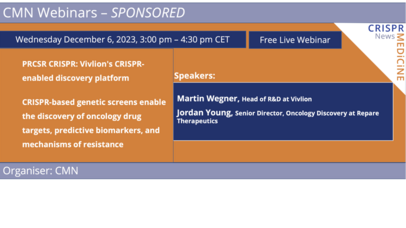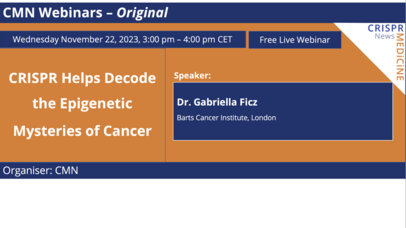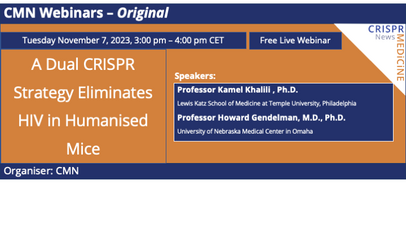CRISPR Helps Decode the Epigenetic Mysteries of Cancer | Wednesday November 22, 2023 | 3:00 pm–4:00 pm CET / 9:00 am–10:00 am EDT
On-demand webinar is available - Follow this link
CRISPR Helps Decode the Epigenetic Mysteries of Cancer
- Physiological roles of aberrant DNA methylation in vitro and in vivo
Aging is associated with an abnormal increase of DNA methylation in human gene promoters, including in bone marrow stem cells. DNA methylation patterns are further perturbed in haematological malignancies such as acute myeloid leukaemia (AML), but the physiological significance of such epigenetic changes is unknown. Previously, Dr. Gabriella Ficz and colleagues have demonstrated that aberrant DNA methylation on the CDKN2A locus in human primary epithelial cells, which they obtained from healthy women undergoing mammoplasty, resulted in a physiological change, and that cells proliferated well beyond the Hayflick limit, exhibiting other cancer-like hallmarks.
Using epigenetic editing of human stem/progenitor cells (HSPCs), that team have now shown that p15 methylation affects haematopoiesis in vivo. Upon editing the CDKN2B (p15) promoter and ARF (p14) using dCas9-3A3L, they observed DNA methylation spreading beyond the gRNA location. They find that despite a transient delivery system, DNA methylation is maintained during myeloid differentiation in vitro, and that hypermethylation of the p15 promoter reduces gene expression. In vivo, edited human HSPCs can engraft the bone marrow of mice and targeted DNA methylation is maintained in HSPCs long term. Moreover, epigenetic changes are conserved and inherited in both myeloid and lymphoid lineages. Although the proportion of myeloid (CD33+) and lymphoid (CD19+) cells is unaffected, monocyte (CD14+) populations decreased and granulocytes (CD66b+) increased in mice engrafted with p15 hypermethylated HSPCs. Monocytes derived from p15 hypermethylated HSPCs appear to be activated and show increased inflammatory transcriptional programs. The team believes that these findings have clinical relevance, since they found p15 promoter methylation in the peripheral blood of patients with clonal haematopoiesis. The recent study shows that DNA methylation can be targeted and maintained in human HSPCs and demonstrated functional relevance of aberrant DNA methylation on the p15 locus. As such, other ageing associated aberrant DNA methylation may impact haematopoiesis in vivo.
What you will learn about in this webinar:
- Epigenetic editing in primary human cells
- Understanding aberrant DNA methylation in healthy cells
- In vivo versus in vitro consequences of epigenetic editing
Webinar Programme (CEST time zone):
- 15.00 Welcome and introduction by Karen O'Hanlon Cohrt PhD., Editor-in-chief, CRISPR Medicine News
- 15.05 Dr. Gabriella Ficz / Barts Cancer Institute, London | CRISPR Helps Decode the Epigenetic Mysteries of Cancer | Physiological roles of aberrant DNA methylation in vitro and in vivo
- 15.45 Q & A with Dr. Gabriella Ficz
- 16.00 Close by CRISPR Medicine News
Speaker | Title:
Dr. Gabriella Ficz / Barts Cancer Institute, London | CRISPR Helps Decode the Epigenetic Mysteries of Cancer | Physiological roles of aberrant DNA methylation in vitro and in vivo
Speakers
Dr. Gabi Ficz / Barts Cancer Institute, London

Dr. Gabriella Ficz is a Reader and Group Leader at the Barts Cancer Institute, Queen Mary University of London. Her lab aims to discover the epigenetic mechanism operating at the boundary between normal and cancer, which may be abnormal but reversible. Her vision is to be able to develop potential drugs that can prevent these changes before cancer can be triggered and many damaging mutations occur. She was awarded her MSc/PhD in Molecular Biology in 2005 at the International Program in Molecular Biology, Max Planck Institute for Biophysical Chemistry Goettingen, Germany, with her thesis titled “Protein dynamics in the nucleus: Implications for gene expression”.
Read our CMN interview with Dr. Gabriella Ficz here.
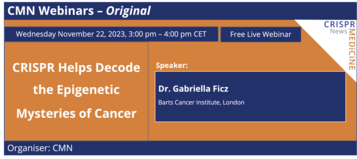
CMN Articles - Epigenetic editing

